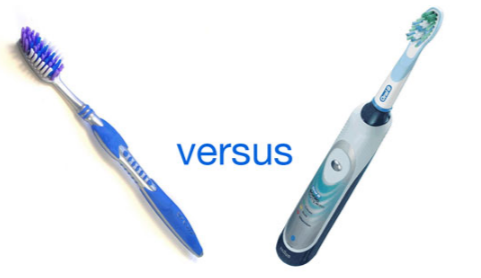Electric toothbrush vs. manual brushing — which is better? Some dentists recommend getting an electric toothbrush as a way to deal with plaque and gum disease.
Are electric toothbrushes really more effective?
Here were the results of a short-term study that evaluated electric toothbrushes and manual toothbrushes:
Electric Toothbrush vs. Manual Brushing Test Results Using Braun Oral B
- Electric toothbrush 86% plaque index reduction
- Manual toothbrush 85% plaque reduction
- Electronic toothbrush reduction of bleeding from baseline 95%
- Manual toothbrush reduction of bleeding from baseline 90%
There were differences, but they were slight.
Electric Toothbrush vs. Manual Brushing Test Results Using Ultrasonic
- Electric toothbrush plaque index reduction 50%
- Manual toothbrush plaque index reduction 60%
- Electric toothbrush bleeding index reduction 35%
- Manual toothbrush bleeding index reduction 26%
The study concluded that a long-term study of using powered toothbrushes was necessary to fully evaluate electric toothbrushes, but that they do achieve a moderate reduction of plaque and bleeding gums.
How Long and Well Do You Brush?
The question is not so much “To brush or not to brush?” We all know that brushing your teeth at least twice a day is important. The question is more about how to brush.
Many people wonder whether or not it’s worth their while to invest in an electric toothbrush. Whether it is or not often depends on how you brush your teeth.
If you don’t brush for two minutes and get behind the teeth and into the crevices, you may not be brushing well enough. Electric toothbrushes get adults and children who don’t brush long enough to brush longer and typically do a more thorough job. They are more likely to get into areas you don’t reach with manual brushing.
Educating patients about dental care so they know what to do is vital for good oral hygiene, and Dr. Baker is always glad to answer your questions and explain facets of dental technology.







Recent Comments